★★
“Not the promised thrill adventure of a lifetime.”
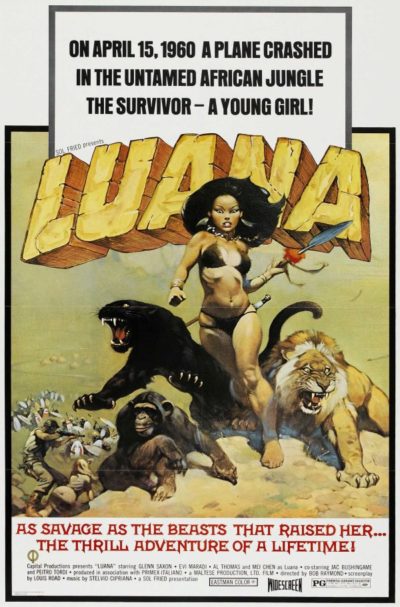 Despite a broad range of impressively kick-ass posters, in which renowned artists Frank Frazetta and Russ Manning had a hand, the heroine of the title (Chen) is much more of a supporting role than the star, and that’s a disappointment. While competently made, compared to others of the genre, its failure to deliver what the advertising promises, and indeed much jungle-girling at all, earns it a significant downgrade. The backstory is more or less the usual: a plane crash in darkest Africa leaves one survivor, the three-year-old daughter of a scientist and an Asian princess(!), who somehow survives in the rain-forest. She grows up to wander round her domain with a chimpanzee sidekick, wearing nothing but a loin-cloth and hair that magically affixes itself over her breasts, this being a firmly PG-13 rated jungle romp.
Despite a broad range of impressively kick-ass posters, in which renowned artists Frank Frazetta and Russ Manning had a hand, the heroine of the title (Chen) is much more of a supporting role than the star, and that’s a disappointment. While competently made, compared to others of the genre, its failure to deliver what the advertising promises, and indeed much jungle-girling at all, earns it a significant downgrade. The backstory is more or less the usual: a plane crash in darkest Africa leaves one survivor, the three-year-old daughter of a scientist and an Asian princess(!), who somehow survives in the rain-forest. She grows up to wander round her domain with a chimpanzee sidekick, wearing nothing but a loin-cloth and hair that magically affixes itself over her breasts, this being a firmly PG-13 rated jungle romp.
However, the real stars are the scientist’s other daughter, Isabel Donovan (Marandi), who is seeking answers to her father’s disappearance, and jungle guide George Barrett (Saxson). He knows of Luana, having been rescued by her after being attacked by savages on a previous trek into the jungle. Also along on the trip is her father’s partner, the somewhat creepy Norman (Tordi), who appears to have a more than guardian-like interest in Isabel. It soon becomes clear that “someone” – and let’s be honest, you deserve no prizes for guessing who, 30 seconds after they show up – doesn’t want the truth about the crash to be established. Meanwhile, Luana is lurking on the edge, saving her sister from a spider, stealing her clothes when Isabel takes a dip, etc.
It’s a definite shame there wasn’t more Luana, as her character possesses a sweet innocence which is quite endearing, and certainly more fun than watching the bland Isabel and George traipse through another section of faux-jungle or react to the usual stock footage [though this is integrated somewhat better than usual]. For example, witness the scene where Luana tries to figure out how to use a bra; it’s naively charming, and I’d have loved to have seen more of this angle. Indeed, the script itself is solid enough, with a number of sequences which clearly have potential. For example, there’s George arm-wrestling a tribesman, with scorpions set up on either side to greet the loser with their sting. The film also has a carnivorous plant. How can you go wrong with a carnivorous plant?
The answer appears to be director Infascelli, operating under a pseudonym, as he manages to suck the excitement out of every sequence, courtesy of pedestrian execution. But one final anecdote will sum up the overall ineptness here. When the film got US distribution, Ballantine Books commissioned Alan Dean Foster to write a novelization However, the only available copy of the script was in Italian, so Foster wrote a new novel based on the Frazetta poster. I can’t help thinking any film based on that would likely be rather better than the actual movie.
Dir: “Bob Raymond” (Roberto Infascelli)
Star: Glenn Saxson, Evi Marandi, Mei Chen, Pietro Tordi





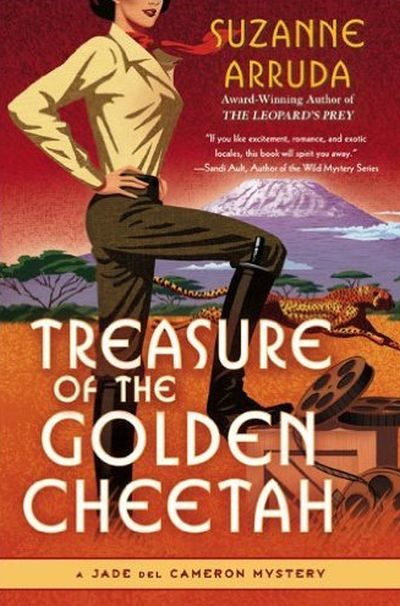 In the 10th century B.C., the kingdom of Sheba (or Saba –the S and Sh sounds were still fluid in the Semitic alphabets of that day) straddled the Arabic and African sides of the southern entrance to the Red Sea, and enjoyed considerable income from its control of that trade route. Both the Old Testament books of I Kings and II Chronicles record a state visit by the Queen of Sheba to King Solomon. Neither of these writers record her name (it varies in the legends, but the most common name given is Balkis or Belkis –English transliterations vary) or much about her, and written records from Sheba at this time have not survived; but she’s also mentioned in the Koran. Jewish, Arabic and Ethiopian legends (the latter written down in the ancient writing Kebra Negast, or “Glory of Kings”) some of which probably preserve actual handed-down oral history, greatly elaborate the story, and the latter makes Solomon out to be the father of her son and heir, Menelik. (The royal house of Ethiopia historically claimed descent from Solomon through Menelik.) The legends of the Masai and other African peoples south of Ethiopia also credit Menelik with a great (and obviously historically memorable) expedition through their territories. This real-life material provides the basis for Jade del Cameron’s fifth adventure.
In the 10th century B.C., the kingdom of Sheba (or Saba –the S and Sh sounds were still fluid in the Semitic alphabets of that day) straddled the Arabic and African sides of the southern entrance to the Red Sea, and enjoyed considerable income from its control of that trade route. Both the Old Testament books of I Kings and II Chronicles record a state visit by the Queen of Sheba to King Solomon. Neither of these writers record her name (it varies in the legends, but the most common name given is Balkis or Belkis –English transliterations vary) or much about her, and written records from Sheba at this time have not survived; but she’s also mentioned in the Koran. Jewish, Arabic and Ethiopian legends (the latter written down in the ancient writing Kebra Negast, or “Glory of Kings”) some of which probably preserve actual handed-down oral history, greatly elaborate the story, and the latter makes Solomon out to be the father of her son and heir, Menelik. (The royal house of Ethiopia historically claimed descent from Solomon through Menelik.) The legends of the Masai and other African peoples south of Ethiopia also credit Menelik with a great (and obviously historically memorable) expedition through their territories. This real-life material provides the basis for Jade del Cameron’s fifth adventure.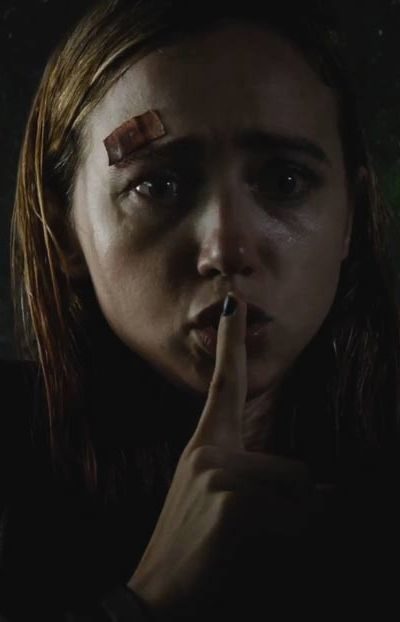 There is a time when a film-maker needs to fall out of love with their script, and approach the resulting movie with a cold, critical eye, analyzing every scene with a single question in mind: Is it essential to the story being told? And if the answer isn’t “Yes”, then the scene needs to be ruthlessly excised. If you don’t, then what results is this film, where a good idea, which could have been lean, mean survival horror at its most stripped-down, becomes instead a cumbersome exercise in social drama.
There is a time when a film-maker needs to fall out of love with their script, and approach the resulting movie with a cold, critical eye, analyzing every scene with a single question in mind: Is it essential to the story being told? And if the answer isn’t “Yes”, then the scene needs to be ruthlessly excised. If you don’t, then what results is this film, where a good idea, which could have been lean, mean survival horror at its most stripped-down, becomes instead a cumbersome exercise in social drama.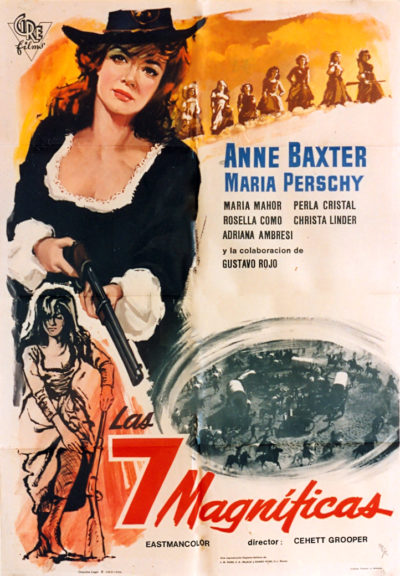 A wagon train on its way West to California is besieged by multiple waves of Apaches. Between attacks, the seven women among the settlers are hidden in a nearby cave, but the next assault proves terminal, and the women are left, alone and deep in enemy territory. The only hope for this band of largely unprepared women, is to strike out across a hostile landscape. They’ll need to cross 100 miles between them and the nearest settlement, Fort Lafayette, while fending off further native attacks.
A wagon train on its way West to California is besieged by multiple waves of Apaches. Between attacks, the seven women among the settlers are hidden in a nearby cave, but the next assault proves terminal, and the women are left, alone and deep in enemy territory. The only hope for this band of largely unprepared women, is to strike out across a hostile landscape. They’ll need to cross 100 miles between them and the nearest settlement, Fort Lafayette, while fending off further native attacks.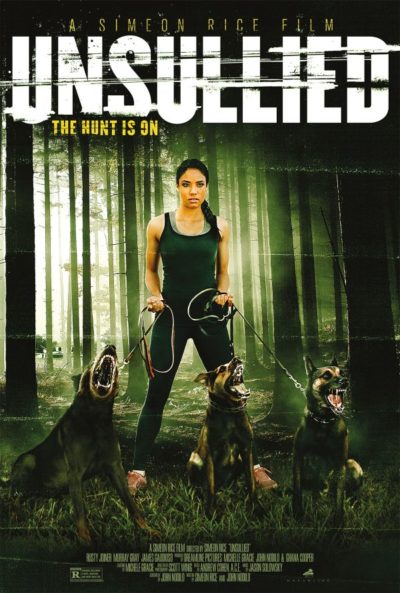 If you’re looking for unsubtle social commentary, you’re in the right place, because this take on The Most Dangerous Game ticks off the trifecta of -isms:
If you’re looking for unsubtle social commentary, you’re in the right place, because this take on The Most Dangerous Game ticks off the trifecta of -isms: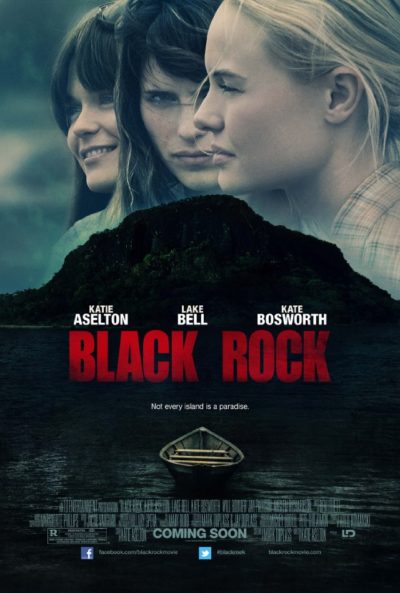 Maybe I’m getting old and deaf. Or maybe it’s just not a good idea to have dialogue that appears to consist largely of characters yelling (or whispering) over the top of each other. Either way, probably a negative the muddy audio is the main thing I remember about this survival horror film. Childhood friends Sarah (Bosworth), Abby (Aselton) and Lou (Bell) re-unite for a weekend on an island near where they grew up. There’s some reluctance here, Abby and Lou not having been on speaking terms for some years, due to the latter having slept with the former’s boyfriend years previously. The island is supposedly deserted, so they’re surprised to encounter three men hunting there, one of whom is known to Lou. A drink leads to another, and before you know it, Abby has fended off advances, in lethal fashion. The two survivors don’t take kindly to this, and begin hunting the trio to take revenge for their friend.
Maybe I’m getting old and deaf. Or maybe it’s just not a good idea to have dialogue that appears to consist largely of characters yelling (or whispering) over the top of each other. Either way, probably a negative the muddy audio is the main thing I remember about this survival horror film. Childhood friends Sarah (Bosworth), Abby (Aselton) and Lou (Bell) re-unite for a weekend on an island near where they grew up. There’s some reluctance here, Abby and Lou not having been on speaking terms for some years, due to the latter having slept with the former’s boyfriend years previously. The island is supposedly deserted, so they’re surprised to encounter three men hunting there, one of whom is known to Lou. A drink leads to another, and before you know it, Abby has fended off advances, in lethal fashion. The two survivors don’t take kindly to this, and begin hunting the trio to take revenge for their friend. In February 2002, Ingrid Betancourt was travelling through a rural area of Colombia, as part of her campaign in the presidential election for the Green Party. She was stopped at a road-block run by the Marxist rebel organization, FARC, and when they realized who they had, she and her assistant, Clara Rojas, were kidnapped. Betancourt would spent more than six years of jungle captivity with the guerillas, until she was rescued, in a startling piece of deception, by Colombian military forces. This documentary film tells her story, through archive footage and interviews with Betancourt, Rojas, other kidnappees and some of the FARC members.
In February 2002, Ingrid Betancourt was travelling through a rural area of Colombia, as part of her campaign in the presidential election for the Green Party. She was stopped at a road-block run by the Marxist rebel organization, FARC, and when they realized who they had, she and her assistant, Clara Rojas, were kidnapped. Betancourt would spent more than six years of jungle captivity with the guerillas, until she was rescued, in a startling piece of deception, by Colombian military forces. This documentary film tells her story, through archive footage and interviews with Betancourt, Rojas, other kidnappees and some of the FARC members.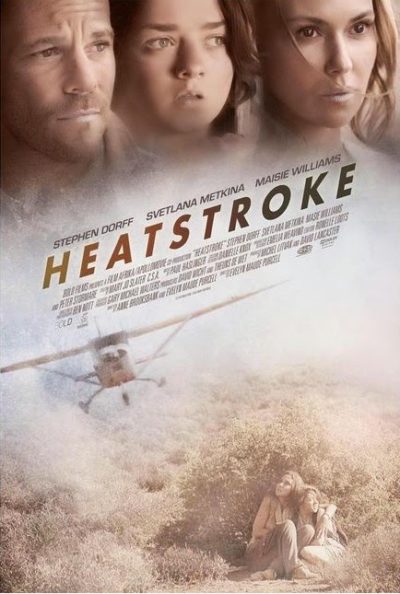
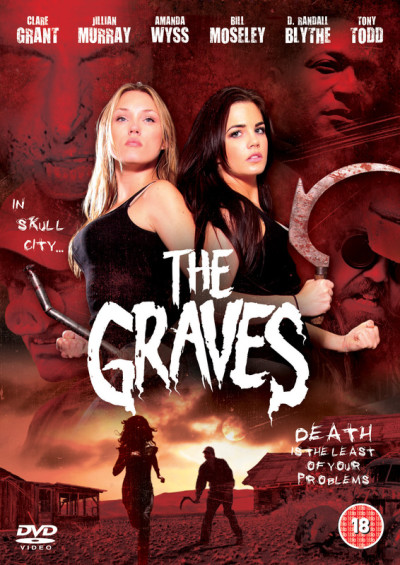
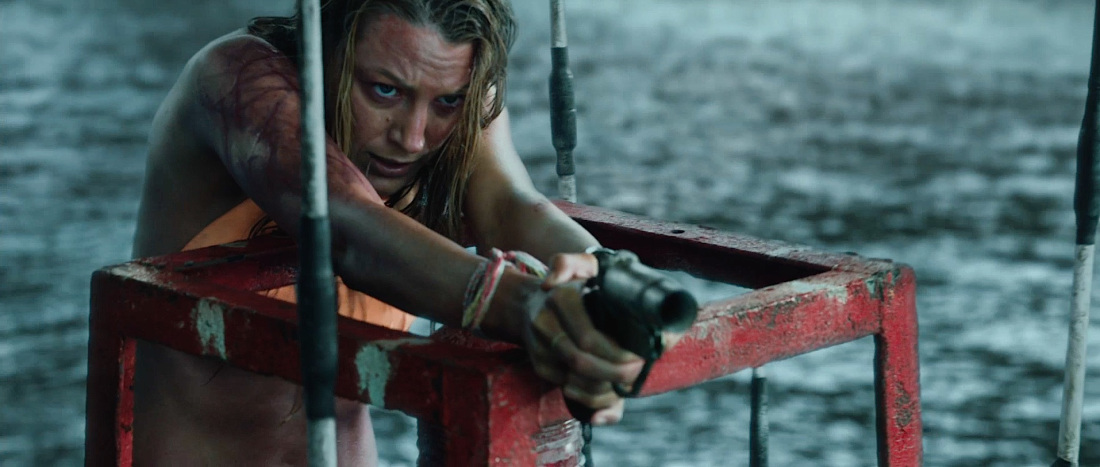 The older I get, the less any kind of extreme sports appeal. It’s likely an awareness that life is limited, and I’d rather hang on to it for as long as possible, rather than risk it in pursuit of a quick thrill. Parachuting? Skiing? Hell, even camping? No, thanks. I’ll be by the pool – not in it – with a cold drink and an exciting novel. This inevitably limits the attraction of this kind of “true life” adventures, because they rarely bother to demonstrate why the protagonist is doing what they are. Admittedly, that’s not the point: it’s all about the peril into which they get, and their struggles to extricate themselves. Everything else is somewhat superfluous, and that’s one of the issues here. Do we care about Nancy’s mid-twenties career choice crisis? Or that she’s on the beach because her late mother was there decades previously? Probably not. We’re here to see woman vs. shark.
The older I get, the less any kind of extreme sports appeal. It’s likely an awareness that life is limited, and I’d rather hang on to it for as long as possible, rather than risk it in pursuit of a quick thrill. Parachuting? Skiing? Hell, even camping? No, thanks. I’ll be by the pool – not in it – with a cold drink and an exciting novel. This inevitably limits the attraction of this kind of “true life” adventures, because they rarely bother to demonstrate why the protagonist is doing what they are. Admittedly, that’s not the point: it’s all about the peril into which they get, and their struggles to extricate themselves. Everything else is somewhat superfluous, and that’s one of the issues here. Do we care about Nancy’s mid-twenties career choice crisis? Or that she’s on the beach because her late mother was there decades previously? Probably not. We’re here to see woman vs. shark.